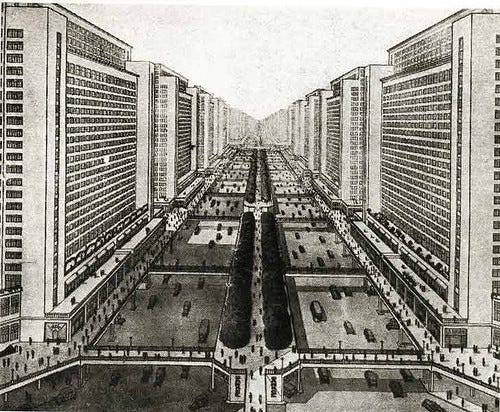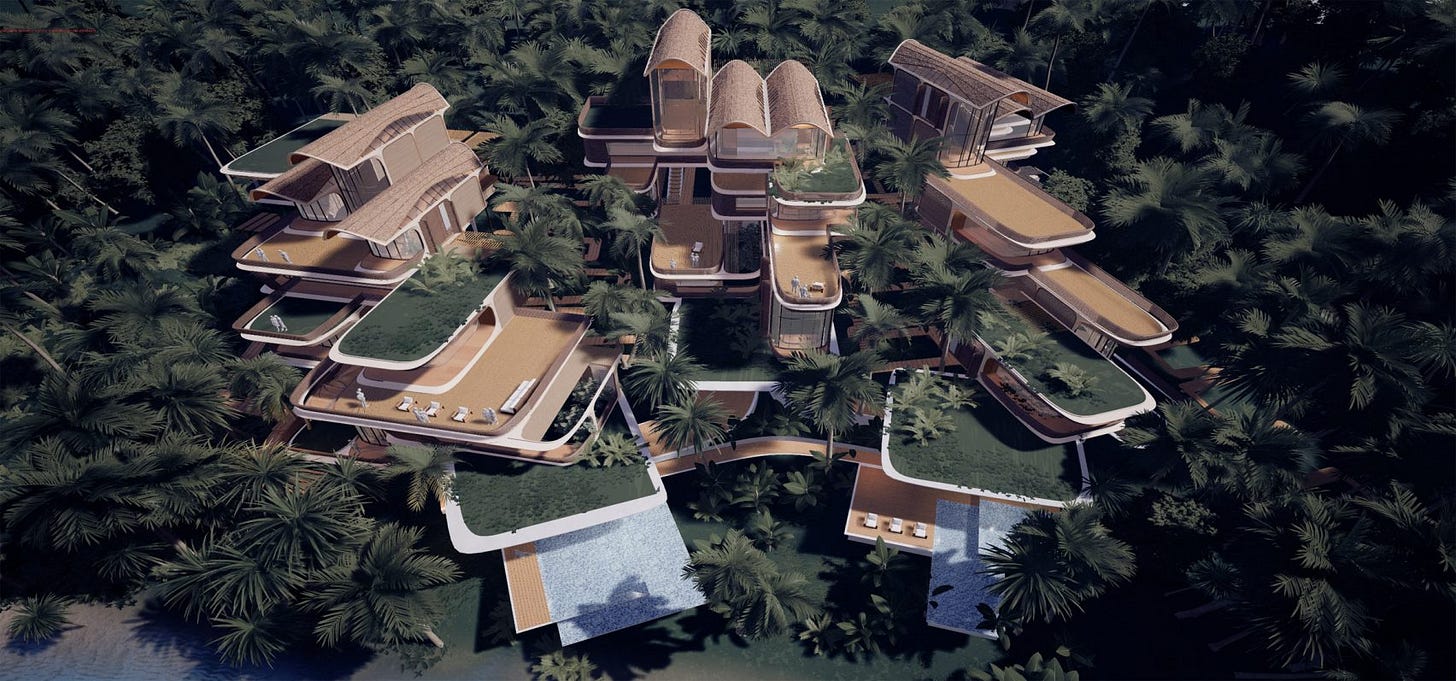Next stop, Utopia
“The people who are crazy enough to think they can change the world are the ones who do.”
“I plan on becoming a dictator and I don’t plan on having a successor,” says J, a serial entrepreneur who, for the past few years, had turned his sights towards a bigger project – creating a tech-driven charter city. He turns to me with a mischievous smile, keen to see my reaction. “Right,” I reply, “Go on.”
We are sitting next to the rooftop pool of J’s office building, overlooking the vast expanse of Austin’s evermore sprawling urban landscape. It’s dusty. Hot, with not a cloud in the sky. A far cry from the wintery England both J and I had travelled from.
The comment, obviously tongue in cheek, comes as we speak about J’s plans for the city he plans to build – his version of utopia. He continues, explaining that the governance infrastructure he will implement will negate the need for a leading authority. Smart contracts, AI, digital twins and blockchain are just some of the technologies that could make it happen.
He believes in technology’s potential to improve many aspects of the world we live in. “Look at this weather, for example!” he exclaims. “What’s stopping us creating this back home [the often grey UK] all the time?” I laugh, reminding him that while it would be lovely to have a slightly sunnier climate, rainwater is pretty essential for water supplies and crop survival. Just days earlier I had been to Lake Travis whose water level had reduced by 40% due to ongoing drought. To this he responds simply – “desalination.”
Much of my conversation with J is full of these big scale ideas that some would say are crazy. Partially I take it as a test. I’d made a beeline for J a few days earlier at a network state house party after he had evaded my previous attempts to contact him for an interview. Now that I had managed to secure a meeting, I had the feeling that half of what he said was meant to scandalise.
However, despite the intended shock factor, it became clear there was real purpose to his plan. That the technology exists to make a more equitable, efficient and abundant society, all he had to do was weave it together in a way that makes sense in practice. This may mean he could make an autonomous city, a new way of living for modern society. At the very least he could try.
Move fast
While not everyone looks to create their own city or network state, J’s sentiment regarding the potential of technology is widespread. In a sense, every innovator or builder I have spoken to or read about has seen innovative technology as a means to make our lives better. Whether that be crypto infrastructure as an alternative to a flawed banking system, DAOs as a way to create affordable housing, psychometric testing as a means to access credit or AI-enabled digital twins to streamline water distribution. Even I came to write about tech with the belief that NFTs could make a fairer art industry.
That’s not to say it’s all “good”. Many of the innovations that we have seen in the past decade have come with a slew of new issues for people to tackle. For example, the increase of data mapping our digital lives has created new concerns over personal privacy, algorithms spark questions over the existence of individual autonomy, data centres pose challenges for energy infrastructure and, for many, the increasing usage of AI is sure to bring widespread unemployment.
And yet, for all the concerns, there are moments where it feels like technology really is delivering on its promises. New treatments accelerated by AI are entering clinical trials faster than ever before. The unbanked are accessing financial services through blockchain-based systems. Innovations with light beams are bringing internet connectivity to rural areas, potentially onboarding them to the digital economy.
These aren’t built into utopias, yet, but they are glimpses of how thoughtful implementation of technology can lead to meaningful improvements in people's lives.
Gatsby’s green light
For centuries, philosophers, writers, architects and inventors have imagined a better world. In the 1500s, Thomas More critiqued the existing governance of Europe and imagined a utopian island of citizens pursuing “true and natural pleasure,” where labour was not tied to citizens’ status or worth.
A century later, Sir Francis Bacon wrote of “A New Atlantis” portraying a future of human discovery with science a driving force towards the betterment of society.
Later still, Robert Owen experimented by building communities of communal living in the quest to build a “village of unity and mutual cooperation” and LeCorbusier built to prove his theory that building with logic and purpose was optimal for modern life.
In the 20th century, thinkers like Buckminster Fuller imagined geodesic domes and resource-efficient cities, arguing that design and engineering could solve global problems like poverty and ecological destruction. Even now, visions of Mars colonies or seasteads echo that same belief, that with the right tools, humanity can start anew.
But utopias have always walked a fine line between inspiration and imposition. Many attempts to realise them, from planned communes to authoritarian regimes, have collapsed under the weight of their own idealism. One person’s utopia can easily become another’s dystopia.
Still, the purpose of utopian thinking was never solely to build perfection. It has served as a kind of working hypothesis. A tool to stretch the imagination, expose the limits of the present and make room for alternative futures.
Perhaps, as philosopher, Ernst Bloch theorised in The Principle of Hope, the idea of Utopia and hopeful potential in the future serves a concrete purpose, acting as a transformative force for change:
“Thinking means venturing beyond [...] Man is that being who can look beyond himself into the not-yet.”
In beta mode
Now the anxiety to create a better world for humanity (whether on Earth or another planet) seems to have reached a fever pitch.
For some, the prospect of a radically different world is just a matter of time. Many believe in the looming possibility of “the singularity” and that we may be on the cusp of creating a superintelligent AI. What that means in practice is split between “like winning the lottery,” and inevitable destruction, depending on who you talk to.
Regardless of the belief in the singularity, increasingly rapid advancements in technology have created a “proof of possibility” for many innovators. For some, it proves that tech could make a material difference to how we live our lives.
And can you really blame them? In the past few years, we’ve seen private companies like SpaceX outpace national space agencies, plants grown from AI generated genetic data, the rise of digital-first communities experimenting with new governance through DAOs and the launch of self driving cars. The idea that code can replace bureaucracy or that cities can be built like startups, no longer feels entirely speculative.
In many ways, we are already living in the test phase of new systems, experimenting with novel economic models, rewriting social contracts in code and increasingly outsourcing decision-making to algorithms.
This newsletter, Utopia in Beta, is meant as a way to track that development, shining a light on the innovations and discussions that are happening in the name of creating a better world.
Some of these ideas will stay niche. Others may change society in ways we can’t yet predict. But all of them tell us something about where we might be headed.
In tracking these experiments and innovations, Utopia in Beta won’t aim for certainty — just curiosity, context and a clear-eyed look at what happens when idealism meets implementation.
If you’d like to be part of the conversation, I’d love to hear from you! Reach me on isabelle@utopiainbeta.com





Great article!
Every utopia begins as a dream, but dreams become dangerous when they lack humility. "Utopia" means different things to everyone you ask... I don't know that I want to live in any of them.
The urge to engineer a perfect world has always danced on the edge of arrogance. Does "technology" transcend the messy reality of human nature? It's so important to distill people's concept of tomorrow. It's unifying when you find synchrony.
But can any smart city or network state escape the gravitational pull of power, privilege, and human ego?
The worst people you know conjure up their picture-perfect paradises, conveniently ignoring that they're the same people who've robbed the most people, come from generational wealth, and have stonewalled progress and equity elsewhere. Now they will lock in founder tier access to a luxury residential settlement to escape the rabble elsewhere. For a concept so forward-thinking, they are short-sighted.
Perhaps the question isn’t how we build utopia, but who we trust to build it, who deserves to live there, and whether their dreams are anything more than castle walls to the world the rest of us have.